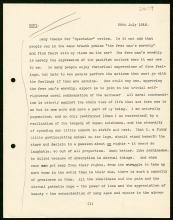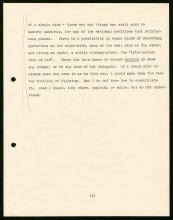BRACERS Record Detail for 116687
To access the original letter, email the Russell Archives.
"Many thanks for 'Spectator' review." (This sentence was addressed to Gladys Rinder, who supplied the review. The letter to her seems not to be extant. This is obviously the "general moralizing" enclosed with it.)
This is a letter "to All and Sundry". In letter, document .200324, record 19337, BR writes: "There is a letter to Miss Rinder somewhere and some general moralizing about 'Spectator' review. Please pass on both after reading. The general moralizing is addressed to All and Sundry." The original of this letter is not extant.
There are three other typed copies:
Document .200299h, record 19333;
Document .007052fp (folio 579), record 93482;
Document .200299g (the carbon of this document), record 116687.
The version selected for the Transcription is that of the current record 116687. Although it has what must be a misreading of BR's hand ("got" for "get" in "And when once men get away from their rights"), the typing is part of a booklet of BR's prison letters typed by Alex. McLachlan, Literary Typing Specialist. The alternative, document .200299H, record 19333, is on A4 paper, which is later in the history of stationery.
Letter 53
BR TO GLADYS RINDER / “ALL AND SUNDRY”, 30 JULY 1918
BRACERS 116687. TL(TC). McMaster. Auto. 2: 88–9
Previous Brixton letter, BRACERS 19337; next letter, BRACERS 116688
Edited by K. Blackwell, A. Bone, N. Griffin and S. Turcon
<Brixton Prison>1
30th July, 1918.
Many thanks for Spectator review. Is it not odd that people can in the same breath praise “The Free Man’s Worship”2, a and find fault with my views on the war?3 “The Free Man’s Worship” is merely the expression of the pacifist outlook when it was new to me. So many people enjoy rhetorical expressions of fine feelings, but hate to see people perform the actions that must go with the feelings if they are genuine. How could any one, approving “The Free Man’s Worship”, expect me to join in the trivial self-righteous moral condemnation of the Germans? All moral condemnation is utterly against the whole view of life that was then new to me but is now more and more a part of my being. I am naturally pugnacious, and am only restrained (when I am restrained) by a realization of the tragedy of human existence, and the absurdity of spending our little moment in strife and heat. That I, a funny little gesticulating animal on two legs, should stand beneath the stars and declaim in a passion about my rights — it seems so laughable, so out of all proportion. Much better, like Archimedes, be killedb because of absorption in eternal things.4 And when once men get away fromc their rights, from the struggle to take up more room in the world than is their due, there is such a capacity of greatness in them. All the loneliness and the pain and the eternal pathetic hope — the power of love and the appreciation of beauty — the concentration of many ages and spaces in the mirror of a single mind — these are not things one would wish to destroy wantonly, for any of the national ambitions that politicians praise. There is a possibility in human minds of something mysterious as the night-wind, deep as the sea, calm as the stars, and strong as Death, a mystic contemplation, the “intellectual love of God”.5 Those who have known it cannot believe in wars any longer, or in any kind of hot struggle. If I could give to others what has come to me in this way, I could make them too feel the futility of fighting. But I do not know how to communicate it: when I speak, they stare, applaud, or smile, but do not understand.
- 1
[document] The letter was edited from a typed copy (document 201179) in the Malleson papers in the Russell Archives; the original is not known to be extant. The letter was published in BR’s Autobiography, 2: 88–9.
- 2
“The Free Man’s Worship” First published in The Independent Review on December 1903 (B&R C03.03), BR included it in Philosophical Essays (1910) and (retitled “A Free Man’s Worship”) in Mysticism and Logic and Other Essays (1918). He later parted ways with the manner of rhetorical expression in the essay but not the outlook described (see A Free Man’s Worship with a Special Preface [Portland, Maine: Thomas Bird Mosher, 1923] and headnote to 4 in Papers 12).
- 3
Spectator review... praise “The Free Man’s Worship” … my views on the war?TheSpectator’s review, eponymously titled “Mysticism and Logic”, appeared in no. 4,695 (22 June 1918): 647–8, and had been brought to BR’s attention by Lucy Silcox (see BRACERS 80383). Mysticism and Logic included “A Free Man’s Worship”. The anonymous reviewer, purportedly male, is identified in the marked copy of The Spectator as Mrs. C. Williams-Ellis, the former Amabel Strachey (1893–1984) and daughter of the Spectator’s editor, John St. Loe Strachey. Her brother was John Strachey. In 1915 she married the architect Major Clough Williams-Ellis, who soon began building Portmeirion, the Italianate village close to BR’s final home in North Wales. In 1960 BR prefaced a sci-fi anthology, Out of This World, Vol. 1, edited by Amabel. It’s not known when they became friends, or whether BR ever knew she was the reviewer. The review praised his style exceptionally highly (“Rather than overload an argument he will go to the most heroic lengths of elimination”) and equally so “A Free Man’s Worship”. Still the review concluded: “Mr. Russell has written a noble and deeply moving work. If the present writer has erred, it is not in praising too highly, but in not being generous enough in his eulogy. And yet, feeling as he does about Mr. Russell’s views on the war, he can say in all sincerity that he would rather be the humblest English soldier fighting for the good cause than have written this most memorable book.” It is, therefore, less surprising that Amabel’s first book written with Clough was The Tank Corps (1919).
- 4
Archimedes… killed ... absorption in eternal things The ingenuity of Archimedes (c.287–212 BC) had greatly assisted the defence of Syracuse from besieging Roman forces during the Second Punic War. As a result, it was ordered that Archimedes be spared when the Greek city eventually fell. But the Greek mathematician and inventor was nevertheless killed — reputedly by an impatient soldier after Archimedes insisted that he complete a mathematical diagram before being escorted to the Roman commander.
- 5
“intellectual love of God” BR quoted Letter 53 in his Autobiography (2: 88–9) and in the same chapter wrote: “What Spinoza calls ‘the intellectual love of God’ has seemed to me the best thing to live by, but I have not had even the somewhat abstract God that Spinoza allowed himself to whom to attach my intellectual love” (2: 38). BR had included a statement of the concept in the Principles of Social Reconstruction lectures: “It is this happy contemplation of what is eternal that Spinoza calls the intellectual love of God. To those who have once known it, it is the key of wisdom” (pp. 245–6). See the discussions of the concept in K. Blackwell, The Spinozistic Ethics of Bertrand Russell (London: Allen & Unwin, 1985). It is a notoriously difficult concept to make precise, but in the current letter BR’s emphasis is on the triviality of moral condemnation. One shouldn’t “find fault with a man for anything he does because he is bound to do that” (interview with Robert Bolt, The Life and Times of Bertrand Russell [London: BBC, 1964], shot list, pp. 12–13 [RA, box 1.31]; quoted in Blackwell, ibid., p. 22).
Textual Notes
- a
“The Free Man’s Worship” Quotation marks and initial caps were editorially supplied on the three occurrences of the title.
- b
be killed Auto. 2: 89 follows document .007052FP, BRACERS 93482, with “to be killed”.
- c
get away from Auto. 2: 89 follows document .007052FP, BRACERS 93482, which follows document 200299H, BRACERS 19333, with “get”. Document 200299G, BRACERS 19332, has “got” but was altered in blue ink by Colette or her editor to “get”.


